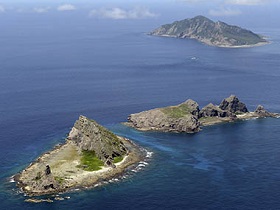The latest edition of the annual IISS Shangri-La Dialogue conference that took place in Singapore on May 29–31, 2015, showed that the problem of the South China Sea, a little-known, distant and exotic land to Russians, is coming to the fore in both regional and world politics. As a matter of fact, the South China Sea is becoming one of the most important points of tension in the world, perhaps on a level comparable to that of the Persian Gulf.
The latest edition of the annual IISS Shangri-La Dialogue conference that took place in Singapore on May 29–31, 2015, showed that the problem of the South China Sea, a little-known, distant and exotic land to Russians, is coming to the fore in both regional and world politics. As a matter of fact, the South China Sea is becoming one of the most important points of tension in the world, perhaps on a level comparable to that of the Persian Gulf.
The situation in the region has featured predominantly in speeches given by United States Secretary of Defense Ashton Carter and the head of the Chinese delegation, Deputy Chief of People’s Liberation Army General Staff Department Sun Jianguo. It is traditionally a topic of discussion among Southeast Asian countries, and the High Representative of the European Union for Foreign Affairs and Security Policy Federica Mogherini hinted during the conference at the willingness of Europe to play a part in its resolution.
The conference traditionally touches upon global as well as regional security issues. One such issue is the expansion of the Islamic State, and was discussed in great deal at the event. As for the other hot topic of the day – Ukraine (understood as “Russian aggression against Ukraine), which was recently placed by U.S. politicians alongside ISIS and Ebola in terms of its severity – it may as well be taken off the global agenda, if the results of the conference are anything to go by.
Ashton Carter failed to mention the Ukrainian crisis in his speech, which mainly focused on the United States’ return to Asia and the role of the United States as the guarantor of peace and stability in the world, and criticized the steps taken by China to create artificial islands in the Spratly Islands.
The only delegate in attendance to mention the Ukrainian crisis was UK Secretary of State for Defence Michael Fallon, who tried to reassert his country’s relevance in international affairs on the back of its complicity in isolating Russia. Given that the United Kingdom’s role in Asian security issues is minimal at best, this seemed to be the only way he could accomplish this.
China’s actions in the South China Sea also took centre stage in unofficial meetings held on the side lines of the forum.
Why is the issue of the South China Sea and the competition for the tiny uninhabitable islands attracting so much attention? Since Russia is trying not to get drawn into problem (and rightly so), Moscow does not seem to fully understand the reasons for the bitter fight over these miniscule, uninhabited and barren islands. However, even if Russia continues to stay out of the problem, which in any case would be the preferred course of action, it still requires a clear explanation as to what all the fuss is about.
The territorial disputes over the South China Sea are only partly to do with the oil and gas reserves located under its seabed. Contrary to popular belief, the disputed areas are not especially rich in recoverable reserves. The main mineral resources in the South China Sea can be found near the shores of the countries that it surrounds, and far from the disputed islands. The Paracel Islands do not have any useful resources, while the Spratly Islands do, but they are few and far between.
Another reason for the disputes is nationalism and wounded national pride, but even this does not fully explain the events. East Asian governments are generally pragmatic in their approach to territorial issues. China has repeatedly found compromise solutions to border disputes (including with Russia).
The true significance of the South China Sea lies in the fact that it is a major trade artery through which the bulk of Asian economies’ energy imports and the majority of its export cargo trade with Europe travel. The South China Sea is also strategically important in terms of the ability to rapidly move naval fleets between the Indian and Pacific oceans. So if any country were to attain military dominance in the region, it would have major global consequences.
In the dispute over the islands between China and the Southeast Asian countries (primarily Vietnam and the Philippines), the sides are trying, first of all, to claim possession of a convenient territory for the potential deployment of infrastructure facilities and, secondly, to obtain the 12-mile territorial waters and 200-mile exclusive economic zone.
At the same time, China’s interpretation of the UN Convention on the Law of the Sea stems from the fact that, while there are no restrictions on maritime traffic in the 200-mile zone, foreign powers are not allowed to conduct military activities there without the permission of the territory’s owner. This view, which is shared by a number of other countries (Brazil, for example), is met with fierce resistance from the United States, who see it as a violation of the freedom of navigation. Theoretically, if China’s claims are realized, the waters could become closed to the U.S. navy, meaning that it would not be able to manoeuvre between its two main areas of deployment – the Middle East and the Western Pacific. If this happens, then the swing in the balance of power in the region towards China will by monumental and irreversible.
The economic value of the South China Sea islands is negligible and would be subject to relatively speedy regulation. Their strategic value, however, is enormous, and no matter who emerges victorious in the struggle for them, the repercussions will be felt on a global scale. Any military crisis in the region will have political and economic consequences for the whole world. International freight traffic would be disrupted, including energy transport. In terms of the fallout, such a situation may be comparable with the shipping violations in the Persian Gulf and the Red Sea.
The recent changes in the alignment of forces in the region are to do with China’s endeavours over the last 18 months or so to expand the islands and sandbanks that it already owns. As a result, China has built over 4 square kilometres of artificial land in the Spratly Islands, enough space to accommodate, for the first time ever in the area, airfields and full infrastructure for a naval base.
However, according to international maritime law, artificial islands located by sandbanks do not affect the delimitation of the territorial sea or the exclusive economic zone. China, however, maintains that it is acting within the law. The fact that the United States has sent planes to fly over the area and ships to sail through it shows that it does not recognize China’s claims.
At the same time, the sides do not seem to want to add fuel to the fire right now. Despite the mutual recriminations, the participants in the Shangri-La dialogue steered clear of confrontational rhetoric. President of the People’s Republic of China Xi Jinping is set to visit the United States in September 2015 and a wide range of global economic and political issues are expected to be discussed. The visit is unlikely to allay the fundamental differences and contradictions that exist in relations between China and the United States, but it will serve as a temporary stabilizing factor.






